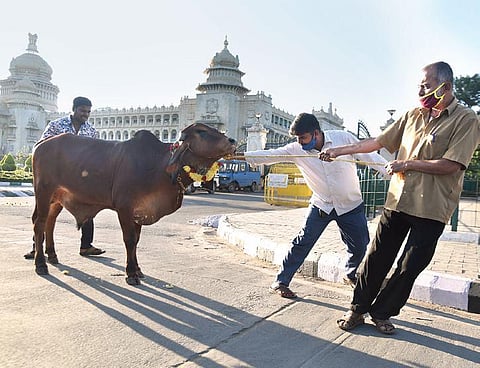

BENGALURU: A day after the the Karnataka Prevention of Slaughter and Preservation of Cattle Bill, 2020, was passed in the Assembly, the Animal Husbandry Department and the Institute of Veterinary Sciences have pointed to some grey areas in it. The queries were raised based on the responses they have been receiving from people and farmers.
“What will happen to the leather and meat business, which is now about Rs 500-700 crore annually? Those in the industry are worried that this Bill will directly hit them. The farmers are also questioning what will happen to the male calves. They state that they have to spend around Rs 100-150 daily to feed them,” said an Animal Husbandry Department veterinarian, who did not want to be named.
Another official said there is no clarity about the impact on the meat market where 2.5 lakh heads of cattle are slaughtered annually, apart from 15-20 lakh sheep and goats. “With the passage of the Bill, there was a 40 per cent drop on the first day itself. The farmers are worried about the impact in the days ahead,” the official added.
Farmers also ask why no provision has been made in the Bill for creating gaushalas. There are many stray cattle on the roads as farmers are unable to take care of them. With this new Bill, their number on the roads will only increase, according to farmers and officials.
The farmers, officials from other departments and the zoo managements who read the draft, wondered about the need for such a Bill. “It is a mere amendment of the 1964 Bill. The government could have done away with that. There are many grey areas which the government now needs to address,” an Animal Husbandry Department official said.